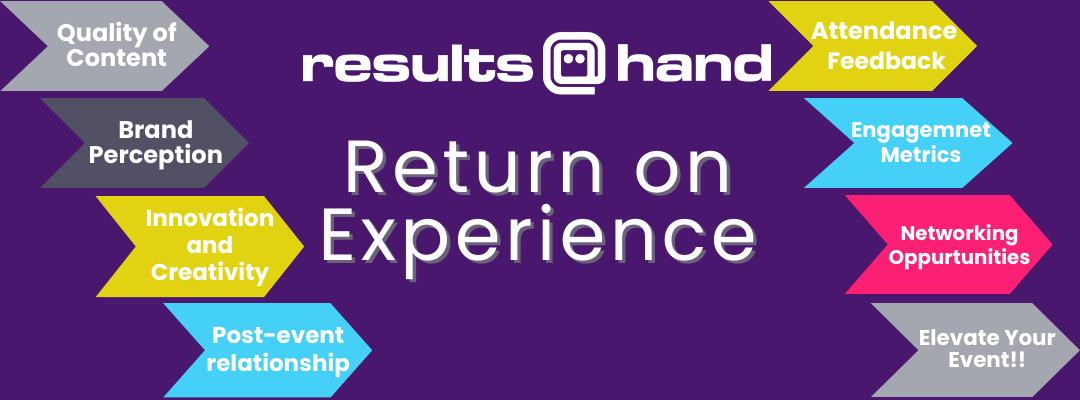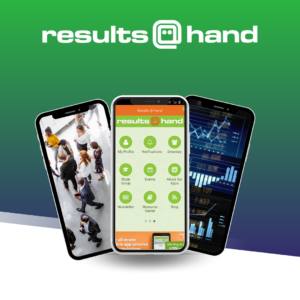ROE – the Metric that matters in 2024!

In 2024, performance metrics go beyond revenue impact, reaching into a realm that evaluates diverse attendee perspectives to enhance overall experience!
Get ready for a groundbreaking method of gauging success, utilizing the pivotal metric of the year! According to Kim Corcoran, CMP, CTA, President of Destination Michigan and Executive Director of Meetings Michigan, “evaluating Return On Experience (ROE) entails examining a variety of elements related to attendee satisfaction and more!” Many of these elements have crucial feedback data already collected in your event app. As we explore the elements that make up ROE, let’s also explore the opportunity to gather metrics and insights from your event management platform and event app.
Attendee Feedback
Attendee feedback provides direct opinions for associations and organizations to consider, enabling them to make necessary edits and improvements. “Collect feedback through surveys, interviews, or social media to gauge attendee satisfaction, perceived value, and overall experience,” Corcoran said. Empower your participants to share their thoughts effortlessly and in the moment by leveraging the dynamic features of your event app. Through evaluations, surveys, and ratings, create an interactive space where attendees can voice their feedback seamlessly. This not only streamlines the process but also ensures that you capture insights while they’re fresh in everyone’s minds. So, let your attendees be the narrators of their event journey, weaving their stories through instant evaluations and interactive surveys. Prioritizing feedback will be an optimal approach to assess an event’s overall experience.
Engagement Metrics
“Track attendee engagement during the event, such as participation in sessions, interactions with speakers, and involvement in networking activities,” she said. Harness the power of your technology by tracking attendance and comparing it with past events or other educational sessions. Take it a step further by overlaying observed interactions within the event app – think chat posts, polling responses, speaker material reviews/downloads, and more. Analyzing engagement metrics equips organizers with valuable data, enabling them to refine the event experience and make informed enhancements for future events.
Quality of Content
The content one publishes should mirror the overall brand and the objectives of the company or organization. According to Kim, “When evaluating the quality of content be sure to evaluate the relevance and impact of the event content, including presentations, workshops, and discussions.” Strategically incorporating rating scales and evaluation links onto the session information screens within the event app facilitates the collection of high-quality metrics for comparative analysis across educational sessions and historical events. 
Networking Opportunities
Another crucial element to consider is networking opportunities. Kim says, “Assessing the effectiveness of networking opportunities provided, as meaningful connections often contribute significantly to a positive event experience.” This transcends a mere tally of networking opportunities; nonetheless, guaranteeing an abundance of such opportunities is imperative. Implement games, lead retrieval, or in-app connections to systematically monitor interactions during networking events. This integration enables the fusion of on-the-floor observations with statistical insights from these activities, offering a comprehensive evaluation of networking success.
Perception
A positive perception can boost trust, credibility, and customer loyalty, resulting in heightened organization success and market recognition. Kim suggests “Examine how the event influences the perception of the hosting organization or brand, considering factors like brand loyalty and advocacy.” By integrating these approaches, event organizers can develop a holistic understanding of the event’s perception, pinpoint strengths and weaknesses, and make well-informed decisions to elevate the experience at future events.
Innovation and creativity
Innovation and creativity provide a competitive edge and enhance adaptability for an organization. Per Corcoran, “Consider the level of innovation and creativity incorporated into the event, as these elements can enhance the overall experience.” Embedding innovation and creativity is a strategic necessity for organizations aiming for a competitive edge and adaptability. Guarantee your event fosters a dynamic atmosphere by analyzing pre-event expectations compared to post-event experiences to gauge the level of surprise or delight among participants. As underscored by Corcoran, assess the innovation level in events to determine the direct impact and enhancement of the overall participants’ experience.
Post-Event Relationships:
The final element in the ROE equation is “examining whether the event has led to ongoing relationships, collaborations, or business opportunities for the event stakeholders.” per Kim. Sustaining these connections requires continuous communication opportunities for participants after the event. Whether members communicate through a year-round event or a membership app, you can collect connection statistics, track engagements, and directly inquire with your members and participants about sustained relationships. This proactive approach allows you to not only assess but also reignite communication between members, fostering a vibrant and interconnected community. Corcoran concludes, “By combining these qualitative and quantitative measurements, event organizers can gain insights into the overall success and impact of their events beyond the traditional financial metrics. This broader perspective on return allows organizations to make informed decisions and improvements for future events based on the participants’ experience.”
Harness the power of this pivotal metric – Return on Experience – with the aid of our ConferenceBeat event app!
Contributor: Kim Corcoran, CMP, CTA, President, Destination Michigan and Executive Director, Meetings Michigan


